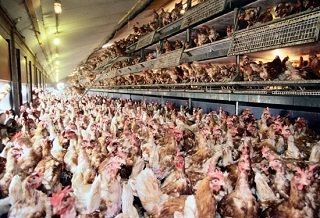Victories for Lobbyists Almost Always Make the World a Dirtier, More Miserable Place

I’m reminded of this because, sadly, the meat lobby succeeded earlier this week in having environmental and sustainability issues considerations removed from the US Department of Agriculture’s 2015 Dietary Guidelines for Americans (DGA). Sustainable food advocates, understandably, are not too pleased. “This is a politically-motivated decision and is not based on either law or science,” attorney and author Michele Simon wrote at The Hill on Wednesday:
In an apparent attempt to reduce the grilling by certain committee members, the Departments of Agriculture and Health and Human Services both announced yesterday that they would not incorporate sustainability into the final version of the document…..The meat lobby is not happy with the Dietary Guidelines Advisory Committee’s (DGAC) conclusion that the government recommended cutting back on hamburgers, hotdogs, and other unhealthy animal foods, both for the sake of our own health, and that of the planet.

I agree with her assessment of the situation. I find several things wrong with the livestock industry beyond what was stated.
I was not able to lay my hands on the actual numbers tonight but I have in the past seen them and I believe at least 82% of corn and as much as 98% of soy production is used as livestock feed. They burn fossil fuel to farm these crops when by growing about 1/3 more crop they could burn vegetable oil in their farm equipment instead and still feed their livestock eliminating fossil fuel usage and the price variability that goes with it for farming altogether. I use the 1/3 number but the reality might be different. USDA says it takes 5 gallons of fuel to farm an acre. Corn will yield about 18 gallons of vegetable oil per acre and soy will yield 40 gallons of vegetable oil per acre. These numbers amount to about 1/3 of the crop volume so the other 2/3 can still be fed to livestock as higher protein feed as normal.
Animal waste is not harvested for use as methane production which could either be burned in generators for electricity and heat or used directly in fuel cells for electricity production. This would eliminate the pollution from that waste and the remains after methane production could still be spread on fields for fertilizer as it is now.
But the thing that ends up galling me the most is recalls. Due to mishandling or unclean conditions usually driven by desire to increase profit margin, I hear of recalls of a million lbs. of beef at a crack and saw one article talking about a 9 million lb. recall. You have to kill about 1538 animals to come up with a million lbs. of beef. So all the energy, water and waste that went into producing those animals is completely wasted and more. After all, in a recall you also have to transport the recalled material back to some location where additional energy must be expended to dispose of the contaminated product.
In the end this industry could use a great deal of reform and our eating habits could use even more reform.
Brian